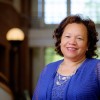This article is more than 5 years old.
I currently serve as the North Carolina Library Association’s state representative to the Southeastern Library Association (SELA). SELA currently has about 250 members and generally partners with southeastern Library State Association Conferences to hold their annual meetings. The last time it met jointly with North Carolina was back in 2004 in Charlotte. I was approached at this conference and asked concerning the possibility of North Carolina hosting SELA during our 2017 conference which is to be held here in Winston Salem.
SELA’s 2014 conference met jointly with the Georgia Library Association (GLA) and the Georgia Association for Instructional Technology, Inc. (GAIT) collectively referred to as the Council of Media Organizations (COMO) in Augusta, Georgia during October 1 – 3. The conference theme was “Transforming our Libraries: Master the Possibilities in Augusta.”
NCLA was well represented at the SELA conference. Kathy Bradshaw (UNCG) and I teamed up to present “Leading from the Middle: Are You Ready?” Middle managers are often in a difficult position; not always the ones to have a hand in developing the strategies and subsequent decisions, but generally the one tasked with seeing that they are implemented. We shared with the audience details surrounding the values middle managers bring to an organization, discussed some of the common challenges they face, outlined the most desirable managerial traits and also offered suggestions on how they might be best prepared for the job. As a leader, when your staff think of the following traits, will they think of you? Are you competent, honest, trustworthy, fair, consistent, passionate, empathetic and approachable? In conclusion we offered practical solutions to a few of the audience participants’ real life quandaries.
Michael Crumpton, also of UNCG, shared insight on “Meeting the Challenge of Community College Librarianship: Trends Ahead and Competencies needed.” Community Colleges serve about 50% of all undergraduates in the United States. Most have the least amount of staff, many lack the range of critical resources all of this while serving the most diverse student populations. Changes within the high school curricula such as the creation of early and middle college programs are among the many trends which continue to have huge implications to the work of Community College librarians. I found this statistical data, as it relates to community colleges, most interesting.
- Over 1200 Nationwide
- Over 12.4 million enrolled
- Average age = 28
- 15% age 40 plus
- 42% first generation
- 58% women
- 45% minorities
- Large % employed
Crumpton’s second presentation ran concurrently with the session I presented in, so I was unable to attend. He spoke, upon my request, to our statewide planning efforts in the creation of the NCLA Leadership Institute. His presentation may well serve as a resource for my upcoming conversation with SELA board members around the possibility of conducting a regional leadership institute.
The “Virtue of Value-Based Leadership” session leader reminded attendees that librarians have a long history of upholding intellectual freedom, equal access to information for all, privacy and other social values. However, when library leaders design programs, services and other offerings do those values remain at the heart of the libraries and librarians? Do we empower our staff to make values based decisions? Are the values of the University interwoven within the library mission statement? Does your library clearly state and share its values with the public? I was eager to say that our library does!
Trevor Dawes, ACRL President, was the closing keynoter. He shared more on his campaign for libraries to partner with campus financial aid and student services offices in the fight for financial literacy. Of student debt, roughly 26% of it comes from cost associated with the purchasing of textbooks. Are libraries willing to take the fight for open educational resources? Washington University partnered with a local bank conducting an informational session around financial literacy. Attendees indicated that they found the program worthwhile. Topics suggested for future conversations centered on loans, budgets and investment strategies. Also RUSA was recently awarded an IMLS grant to create a best practices document on this topic.

2 Comments on ‘SELA/COMO’
Sounds like it was a worthwhile conference!
I’d like to see your presentation to Middle Managers, Wanda. Will there be an opportunity to do the presentation here? Or can you make the slide deck available? Thanks for the recap.